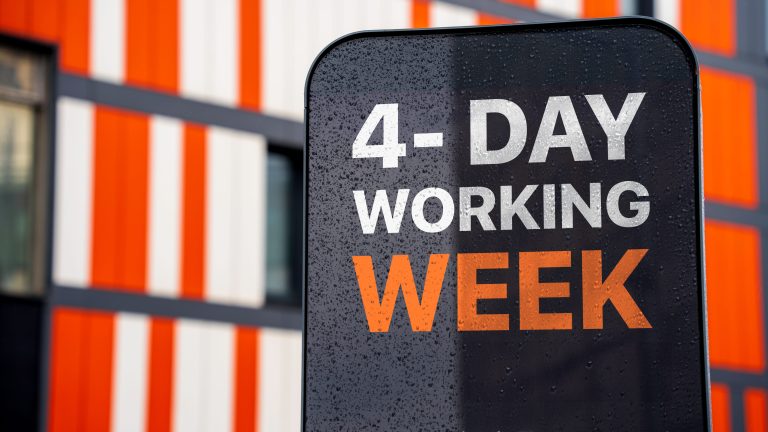BLOG
Almost half of businesses are unprepared for hybrid working, our research finds
Written on 15 June 2021

‘Hybrid working’ has become the new buzz term for businesses who are thinking progressively about their post-pandemic plans and keen to embrace new ways of working.
It seems that, as the end of lockdown approaches, many employers are coming to the same conclusion: a black-and-white approach – office or home – simply won’t work.
Indeed, Apple’s plans for a widespread return to the office have recently been challenged by employees who feel under pressure to “choose between either a combination of our families, our wellbeing, and being empowered to do our best work”.
But while more than a quarter of employees would be willing to slightly reduce their salary in order to have more flexible working conditions, others are itching to get back to the office, with 19% of employees saying they would quit their jobs if forced to work from home full time.
Against this context, a hybrid approach seems to be a sensible option. In fact, according to a recent poll, 90% of organisations are now planning to go down this route.
However, our research indicates that almost half (46%) of businesses are still undecided about how exactly they will coordinate hybrid working, and almost one in five have not consulted their staff about changes, potentially exposing them to employee disputes and legal issues.
Most have consulted staff, but many haven't
Encouragingly, 429 of our 528 respondents (81%) said they had consulted or are planning to consult with staff about their preferences for post-pandemic working once restrictions are lifted.
Of these, 74% said that employees’ preferences would “play a significant part” in forming their approach, while 8% said opinion was so divided that it “hasn’t made things any clearer” when it comes to deciding on the right approach to take.
This of course means that 19% of respondents said they had not planned to consult with staff; 11% believe this decision needs to be made by the business, while 8% “already feel they have a good idea what employees want”.
Stephanie Robinson, Director of HR Consultancy at Ellis Whittam and Law At Work, recommends consultation as the best way forward for any business looking to proceed with a hybrid working model.
She explains: “Even if this is just a survey and might not meet the full criteria of how employment law defines consultation, it shows that you are a listening employer, determined to do the right thing for your employees, and interested in how they want to work post-pandemic.”
Indeed, one of the criticisms levelled at Apple by its employees was that they felt “not just unheard, but at times actively ignored.” In this way, even if no clear solution emerges, actively seeking the views of your workforce is likely to prevent disputes and disruption down the line.
From an employment law perspective, Jane Hallas, solicitor and Head of Team at Ellis Whittam, advises that consultation is important if an employer wants to make changes to where and when people work, “to avoid potential constructive unfair dismissal and breach of contract claims, if employees resign in protest”.
Related Content
Do you need support?
Speak to us for an honest, no obligation chat on:
0345 226 8393 Lines are open 9am – 5pm
Almost half are unsure how a hybrid model will work in practice
Crucially, 46% of businesses say they are “still undecided” about how they will coordinate a hybrid approach across their workforce in real terms.
One in three (34%) say they plan to introduce hybrid working on a departmental level, allowing each area of the business to decide which days people will work from the office. This would appear to make sense over a company-wide approach given the diverse nature of employees’ roles, some of which will be able to be done equally well from both the employee’s home and in the office, while others may simply not be suited to remote working, impacting your ability to deliver on key business objectives.
Meanwhile, of the remaining businesses that have also made up their minds, 12% plan to give individual employees “complete flexibility” over which days they work from home, while 9% say they expect all employees to work from the office on the same days.
Stephanie Robinson says: “Employers will naturally want to know what competitor businesses are planning to do around hybrid working and exactly what this will look like, as this may help inform their own policies and practices. At the moment, it seems a large proportion of organisations are still working through this issue, and it will be interesting to see which sectors are able to exercise ‘complete flexibility’ as, although desirable, this may not be so simple to achieve in reality.”

Larger organisations are less confident
Our research also revealed a greater lack of confidence amongst larger organisations when it comes to hybrid working, both in terms of productivity and senior leadership support.
When asked whether they were worried that productivity levels may start to decline as people become accustomed to hybrid working, 70% of respondents said “no”. Of these, 55% said they trust their staff to stay focused and on task, while 15% are actually predicting an increase in productivity post-pandemic.
However, interestingly, only 61% of large organisations shared this confidence, compared to 71% of SMEs.
Stephanie Robinson says the fact that, on the whole, businesses are not concerned that productivity will drop is a promising sign. “As an HR practitioner, it’s great to see that businesses are aiming for an output-based, high-trust model and are not getting overly anxious about how employees will deliver,” she says.
“What’s more, of the 30% of respondents that do have concerns, 16% told us they have adapted or will adapt their practices to ensure productivity remains high. This is great news, as it shows a willingness to overcome one of the main barriers that can often dissuade businesses from this type of approach – there’s definitely a mindset shift.
“For the remaining 14% that said a decline in productivity is a real concern and they are not sure how to prevent it, help is available – you can always contact us for advice.”
In addition, more than three-quarters (77%) of SME respondents believe their senior team fully supports hybrid working, whereas this is slightly lower for larger organisations at 69%.
Stephanie says buy-in from senior leadership teams is a crucial factor when considering whether hybrid working will work for your organisation. She explains: “If senior individuals within the business view hybrid working as an engagement tool, understand the links to high-performance working, and are more open to agility and evolution, they are far more likely to promote this approach within wider workforce, making successful implementation more likely.
“If they are not on board, this is something you should seek to address before going any further.”
Jane Hallas also advises that performance management processes are adapted to accommodate hybrid working and that there is clarity over deliverables. “If an employee’s productivity then falls, this can be tackled through the performance management process”, she explains.
“Similarly, if there is evidence of an employee taking advantage of the employer’s trust, this should be dealt with through the disciplinary procedure.
About this survey
Ellis Whittam surveyed 528 business leaders responsible for making people management decisions in their organisation between May and June 2021 to find out more about their intentions for hybrid working and how they believe this might impact their organisation.
Put your best foot forward with our flexible working support
From help to reconfigure your contracts to expert advice on difficult employee issues and more hands-on HR consultancy support, our specialist teams are on hand to help you to manage organisational change efficiently and compliantly and make your post-pandemic plans a success.
For support, call 0345 226 8393 or request your free consultation using the button below.
Sign up for the latest news & insights
Resources
Latest News & Insights

Labour’s plans for National Minimum Wage | What employers need to know ahead of April 2025
BLOG Written by Kyle Williams on 21 October 2024 Get ready for a substantial boost to the National Minimum Wage (NMW), which is set to

The dangers of dismissing employees over customer complaints
BLOG Written by Jane Hallas on 27 September 2024 As a business owner or HR professional, protecting your company’s reputation is paramount. As such, when

Are cover letters outdated in the recruitment process?
BLOG Written by Danielle Fargnoli on 26 September 2024 Recruitment best practices evolve over time. For example, employers are beginning to question whether CVs or

4-day week | Benefits, challenges and busting media myths
BLOG Written by Susie Lockhart on 17 September 2024 Recent reports suggest that the UK Labour government is planning to introduce legislation that would give

Grenfell Tower Inquest | Learnings from the Phase 2 report
BLOG Written by Natasha Hamblin CMIOSH, TIFSM on 10 September 2024 On Wednesday, 4 September, the Grenfell Tower Inquiry Panel published its second and final

Sexual harassment | What employers need to know about the new statutory duty
BLOG Written by Lorna Gemmell on 9 September 2024 As an employer, one of your most important responsibilities is to protect and safeguard your workforce

Changes to tipping laws | What employers need to know
BLOG Written Toyah Marshall on 9 September 2024 About 7% of UK workers receive tips as part of their work. Many hospitality workers rely on

6 ways Labour’s proposed reforms will impact schools
BLOG Written by Jane Hallas on 9 September 2024 As the new Labour government continues to advance its legislative agenda, educational institutions must be prepared

Right to disconnect | Could the UK be next?
BLOG Written by Gerard O’Hare on 5 September 2024 In 2024, the boundaries between work and personal life are becoming increasingly blurred. The rise of










